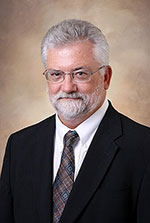Learning by Example: Conversations with Leaders in the Legal Profession that Help Guide Law Students’ Professional Identity Formation
By: Pat Longan, William Augustus Bootle Chair in Professionalism Ethics, Director of the Mercer Center for Legal Ethics and Professionalism, Mercer University School of Law
[Note: This post is adapted from the Foreword to “Inside the Legal Profession – Conversations with Leaders of the Georgia Bench and Bar,” publication forthcoming from Mercer University Press]
All first-year students at Mercer University School of Law take a three-credit course on professional identity. I created the early versions of that course, which began in 2004, and for many years I have taught it with my colleagues Daisy and Tim Floyd. In our course, the students learn that to find success and meaning in the law they need to cultivate a certain kind of professional identity, one that is infused with the traditional values of the profession. The course teaches that lawyers must be competent, faithful to clients, faithful to the law, public-spirited, and civil. It also teaches that lawyers must have the practical wisdom to find the right combination of these virtues for particular situations. To see what we do in that course in detail, take a look at the text we co-wrote, The Formation of Professional Identity: The Path from Student to Lawyer (Routledge Press 2019) and the web page we maintain about it.
Knowing that these are the virtues that lawyers need is important but not enough. Cultivating them is hard work, and there are many obstacles to their implementation in practice. We discovered early in the evolution of the course that we needed to focus not just on the transmission of knowledge but also on motivating the students. We had to show the students the rewards of all that hard work and perseverance. To do that, we needed to bring to them lawyers and judges who are exemplars of the kinds of professionals we are urging them to become.
That need led to the creation of the “Inside the Legal Profession” component of our course. On Monday and Friday mornings over the course of the semester, I interview judges and lawyers with the entire first year class as the audience. I follow the format of the famous “Inside the Actor’s Studio” interviews that James Lipton conducted for many years, and I discuss with each guest his or her life in the law, leaving time at the end for the students to ask questions. The interviews are routinely recorded. More than fifty of the interviews are posted to YouTube, where collectively they have garnered thousands of views. You can find a link to those interviews here. Mercer Law received the 2014 E. Smythe Gambrell Professionalism Award for this project.
Over the years, I have had the privilege of interviewing justices and judges from the federal trial and appellate courts; the Georgia Supreme Court; the Georgia Court of Appeals; various Superior Courts around the state; State Court judges; a Juvenile Court judge; and a Magistrate Court judge. Lawyers from every part of the profession have participated: prosecutors; defense lawyers; big firm, big city litigators and transactional specialists; solo practitioners; divorce and family law attorneys; government lawyers; law professors and administrators; in-house counsel; plaintiffs’ lawyers; insurance defense lawyers; and bar counsel. Our students have heard from members of the profession at every stage of a career, including brand-new graduates who talk about those first months of practice, to young lawyers navigating the partnership track in law firms or struggling to make successes of their own firms, all the way to senior partners and distinguished judges with the perspectives of decades in the profession. The roster of guests has been diverse by gender, race, sexual preference, and ethnicity. At Mercer, we have been honored by the generosity of all the busy and important people who have volunteered their time to help introduce our new students to the many lives in the law from which the students might choose.
This fall, Mercer University Press is publishing the transcripts of eleven of these interviews. It was difficult to choose just a handful of the interviews to include in the book, but the lawyers and judges who appear represent an excellent cross-section of our guests. Five are graduates of Mercer Law School. United States District Judge Louis Sands describes his journey from the time when he was a child and told his mother that he wanted to attend Mercer University – this at a time when no African-American child could do so – through his Mercer education, service as a prosecutor, private practitioner, and Superior Court Judge, to his nomination, confirmation, and service on the federal bench. Angie Coggins talks about what it is like to serve as a public defender, the career choice she made as an intern in Mercer Law School and that she followed for more than thirty years. Tomieka Daniel, who has participated in the series every year since its inception, gives the students a look inside the challenges and rewards of representing clients who need but cannot afford a lawyer for a civil matter and thus turn to her as a legal services attorney. Doc Schneider tells of his serendipitous choice to attend Mercer Law School and how that led to a stellar career at King & Spalding in Atlanta, including working for two other famous Mercer lawyers, former judge and attorney general Griffin Bell and legendary trial lawyer Frank Jones. Lamar Sizemore, Jr., who along with Judge Sands is a member of the famous Mercer Law class of 1974, talks about his three careers, as a highly successful plaintiffs’ lawyer, as a Superior Court judge, and as a mediator. Along the way, he imparts memorable lessons, including what he learned from the late, great Hank O’Neill about how one deals with opposing counsel who mistreat you.
Others who appear in the book have connections to the Mercer Law faculty. Professor Jim Fleissner has taught at Mercer since 1994, and the graduating classes have selected him to receive the teaching award seventeen times; he talks about his earlier career as a federal prosecutor and about how to take advantage of the opportunities that law school affords. Dean Daisy Floyd, now University Professor of Law and Ethical Formation, describes her career trajectory from being an associate at a big law firm through her appointment and service as Dean of the Mercer Law School. Along the way, she had occasion to be a client, and in her interview, she candidly describes the circumstances that led her to need a lawyer and the lessons she learned about lawyering from the experience of being a client. Justice (then Judge) Verda Colvin is an adjunct professor at Mercer; she shares the insight and wisdom of someone who has succeeded in private practice, as a state prosecutor, as a federal prosecutor, and as a judge. Her dedication to excellence, and her courage to be herself as a judge rather than mimic what other judges do, have inspired our students every time she has visited our class.
Two of the interviews in this volume are of lawyers who have no direct connection to Mercer but who nevertheless made the effort to come to Macon and speak with our students. Emmet Bondurant talks about his varied and highly successful career, as a Supreme Court advocate, founder and leader of a highly successful commercial firm in Atlanta, as an attorney for two detainees at Guantanamo Naval Base, and as the pro bono lawyer for a man wrongfully convicted of murder. He describes his motivation for some of his most high-profile pro bono work: “I hate bullies.” Former Chief Justice Harold Melton (now a partner at Troutman Pepper in Atlanta) shared with the class his experiences as the first African-American president of the student body at Auburn University; as a law student at the University of Georgia who placed at “the top of the bottom half of the class;” as a lawyer in the Georgia Attorney General’s office; as counsel to Georgia Governor Sonny Perdue; as a Justice on the Supreme Court of Georgia; and finally as Chief Justice of that Court. He speaks of the importance in his life of the mentorship of a previous Chief Justice, the late Harris Hines.
As part of their development of their professional identities, students need to see and hear from lawyers and judges who have succeeded and found success and meaning in their work. They need to have exemplars, people whose stories inspire them and whose paths they may want to follow. With the help of the people whose interviews appear in the forthcoming book, and the help of the dozens of others who have participated in the “Inside the Legal Profession” project, we have been able to do that at Mercer Law School. If you are interested in doing something similar as part of a professional identity program, or you want to create a professional identity class, then please contact me at longan_p@law.mercer.edu.

Patrick Longan
William Augustus Bootle Chair in Ethics and Professionalism in the Practice of Law, Mercer University School of Law;
Director, Mercer Center for Legal Ethics and Professionalism



